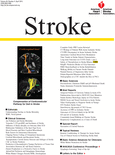Stroke:鱼精蛋白不增加颈动脉支架置入者的额外不良反应
2013-06-14 晓静 译 医学论坛网
美国一项研究表明,应用鱼精蛋白与颈动脉支架置入患者的额外不良反应增加并无相关性。论文6月11日在线发表于《卒中》(Stroke)杂志。 研究旨在评估颈动脉支架置入的卒中患者应用鱼精蛋白是否与卒中风险较高有关。研究共纳入6664例颈动脉支架置入患者,其中556例患者(8%)在治疗时接受了鱼精蛋白治疗。在校正倾向性评分后,与未接受鱼精蛋白的患者相比,接受鱼精蛋白治疗患者的卒中或短暂性脑缺血发
美国一项研究表明,应用鱼精蛋白与颈动脉支架置入患者的额外不良反应增加并无相关性。论文6月11日在线发表于《卒中》(Stroke)杂志。
研究旨在评估颈动脉支架置入的卒中患者应用鱼精蛋白是否与卒中风险较高有关。研究共纳入6664例颈动脉支架置入患者,其中556例患者(8%)在治疗时接受了鱼精蛋白治疗。在校正倾向性评分后,与未接受鱼精蛋白的患者相比,接受鱼精蛋白治疗患者的卒中或短暂性脑缺血发作、住院死亡率、出院至长期护理和穿刺部位并发症发生的可能性相似。

Protamine Does Not Increase Risk of Stroke in Patients With Elective Carotid Stenting
Background and Purpose
Reversal of anticoagulation with protamine might predispose to a higher risk of stroke in patients with carotid stenting. We evaluated a national, multihospital patient database to examine the risk of stroke in patients with carotid stenting receiving protamine compared with those who did not.
Methods
The Premier Perspective database was used to identify patients who were electively hospitalized for carotid stenting from 2006 through 2011. The incidence of in-hospital mortality and morbidity was compared between patients who did and did not receive protamine after propensity score adjustment via 1:1 matching to reduce selection bias.
Results
Of 6664 patients with carotid stenting treated at 193 hospitals, 556 (8%) received protamine on the day of the procedure. After matching by propensity score, patients who received protamine had a similar likelihood of stroke or transient ischemic attack (P=0.77), in-hospital mortality (P=0.12), discharge to long-term care (P=0.15), and access site complications (P=0.90) as compared with patients who did not receive protamine.
Conclusions
Protamine administration is not associated with additional risk of adverse events after carotid stenting.
本网站所有内容来源注明为“梅斯医学”或“MedSci原创”的文字、图片和音视频资料,版权均属于梅斯医学所有。非经授权,任何媒体、网站或个人不得转载,授权转载时须注明来源为“梅斯医学”。其它来源的文章系转载文章,或“梅斯号”自媒体发布的文章,仅系出于传递更多信息之目的,本站仅负责审核内容合规,其内容不代表本站立场,本站不负责内容的准确性和版权。如果存在侵权、或不希望被转载的媒体或个人可与我们联系,我们将立即进行删除处理。
在此留言








#鱼精蛋白#
58
#颈动脉#
54
#不良反应#
65
#颈动脉支架#
52